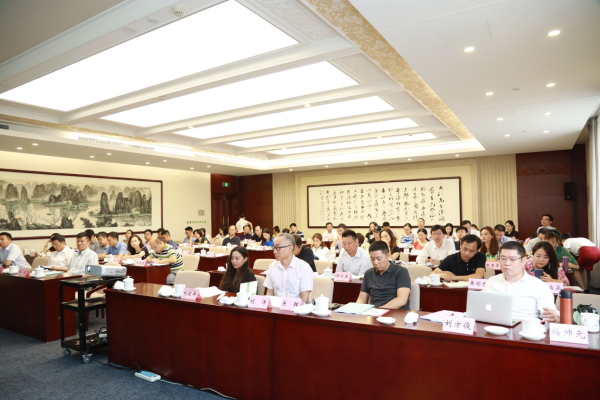Training event helps Beijing companies get listed

A second training session for Beijing media companies to help them get listed on the market, was held at the Beijing Conference Center from Aug 15 to 17. [Photo/bjwzb.gov.cn]
A second training session for Beijing media companies to help them get listed on the market, was held at the Beijing Conference Center from Aug 15 to 17.
About 55 representatives from media companies preparing to be listed on the market, financial institutions and relevant government departments attended the training event.
Among the 38 media companies attending the training session, there was one unicorn enterprise from Zhongguancun, a Beijing hub of innovation, one enterprise to be audited by the China Securities Regulatory Commission and two enterprises recorded by the Beijing Securities Regulatory Bureau, with the average total assets in 2017 reaching 573 million yuan ($82.6 million).
The event was organized by the Beijing Cultural Assets Supervision and Administration Office, Beijing Securities Regulatory Bureau and Shanghai Stock Exchange.
The training focused on financial, legal and compliance issues involved in the listing process of media companies. It also covered issues such as the government's cultural and financial policies, new capital market regulations and listing strategies.
The opening ceremony was held on the afternoon of Aug 15. Zhao Lei, director of the Beijing Cultural Assets Supervision and Administration Office, Dong Dianyi, deputy director of the office and Lu Qian, deputy director of the Beijing Securities Regulatory Bureau, attended the opening ceremony.
There were six special lectures during the 3-day training event. Lu gave a special lecture on the topic of "New Forms of Capital Market Policy Supervision". Feng Qing from Shanghai Stock Exchange, Ni Jun from Zhitong Certified Public Accountants, Lou Aidong from Beijing Kangda Law Firm, Xu Jiongwei, managing director of China Securities Company and Cai Manli, general manager of Heyi Rising Assets Management Co talked about financial and legal issues in the process of listing and mergers and acquisitions.
The first day was filled with meetings discussing listing policy guides between government departments and enterprises.
Officials from related government departments including Wang Jianping, director of the Beijing Securities Regulatory Bureau, Chen Yang, deputy director of the Beijing Banking Regulatory Bureau and Cao Jian, deputy general manager of Shanghai Stock Exchange Listing Center spent two hours talking with the participants and explained policies affecting media companies in the processes of being listed.
The second day of the event had arranged meetings between well-known investment institutions and the companies wishing to be listed.
Representatives of investment and financing institutions such as Wu Ji, general manager of the Investment Department of Beijing Wentou Group, Wang Xiaohui, partner of Shengjing Jiacheng Fund, Liu Zengwei, managing director of Heaven-Sent Capital Management Group and Zhao Li, director of China Equality Group attended and met with participating entrepreneurs.
Leaders of outstanding cultural enterprises had a chance introduce their companies and present their financing needs and exchange contacts with potential investors at the event. The companies include Beijing Chunqiu Yongle Culture Communication Co, Beijing Eventown Century Technology Co, Beijing Xingtuo Vision Media Communication Service Co, Further Space Culture Group, Global United Technology Co, Three-dimensional six degrees (Beijing) Technology Co and Beijing Digsur Technology Co.
After completing training, all participants received the completion certificate during the closing ceremony. The response was very positive, with people saying they learned a lot, cleared up misunderstandings and now have have improved confidence to proceed with the market listing process.
The training session was provided as a service to educate the media companies on the financial knowledge needed to list their companies, and educate more business owners on the functions of capital markets in order to create a better business environment in the country.

 Responsibilities of the SOCAAC
Responsibilities of the SOCAAC Experiencing Beijing 2023
Experiencing Beijing 2023